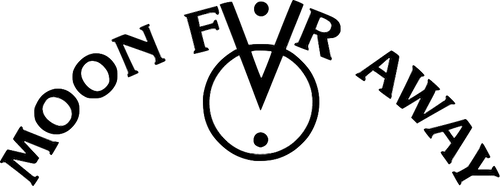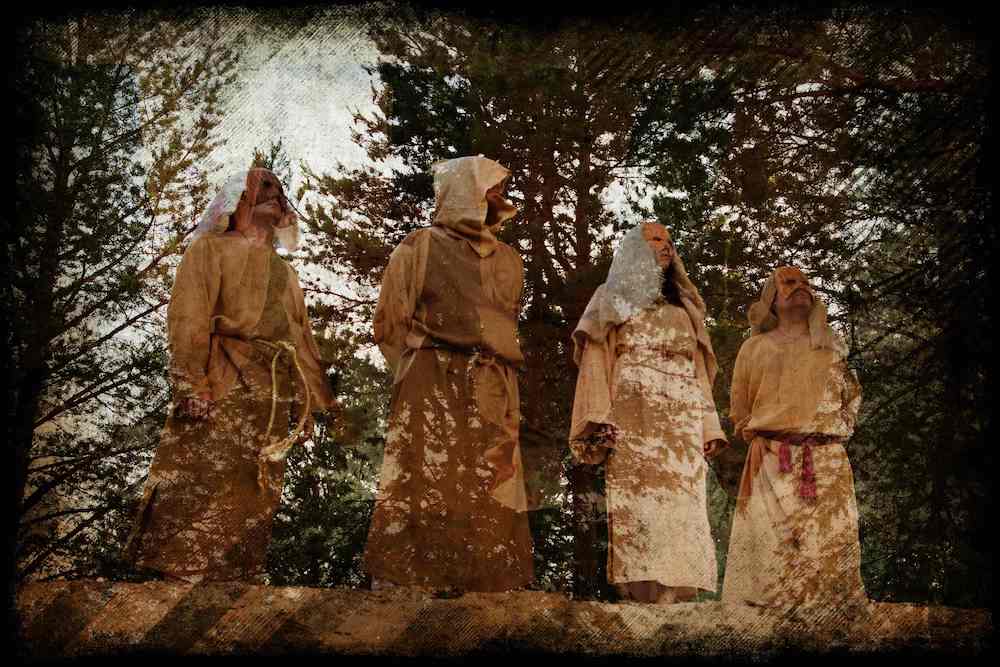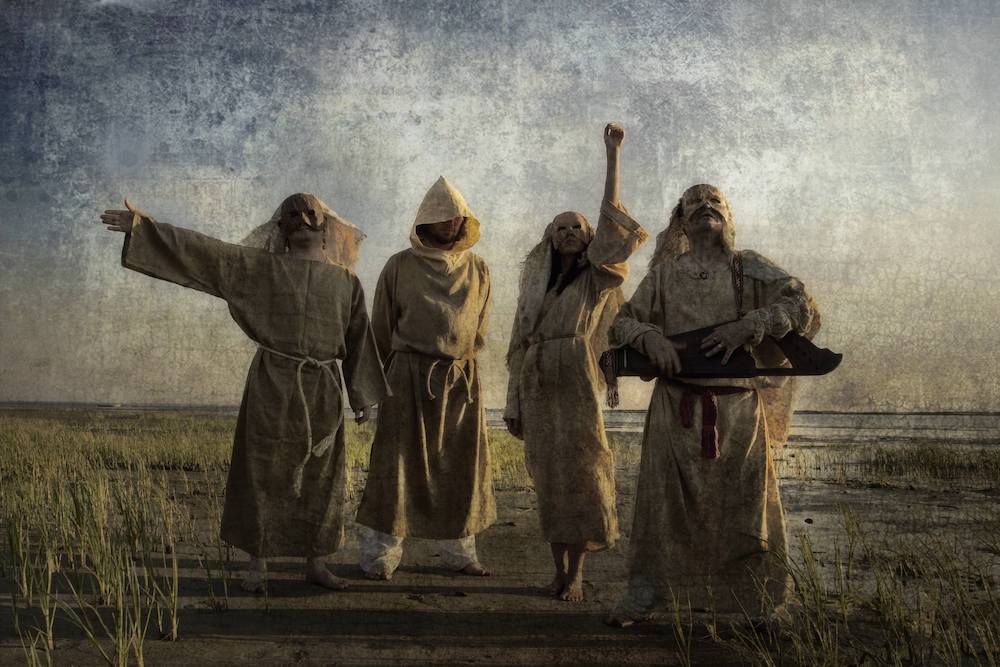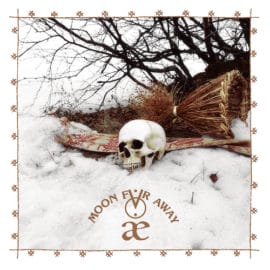In Western Europe Neofolk is usually associated with the music played by bands like Empyrium and Sol Invictus. Folkloristic music from farther in the East, however, sounds noticeably different. On their fifth album as well as Prophecy Productions debut „Athanor Eurasia“, MOON FAR AWAY from Russia aimed to blend both styles into one. In our following interview the head of the band, Count Ash, talked to us about the differences of Western and Eastern music traditions, the often overheard complexity of folk music as well as the typically Russian instruments that the band used on the new album.

Greetings! Thank you very much for taking the time for this interview. How are you doing?
Greetings to everyone who came to this website to read about metal, but is now reading about the esoteric folklore of the Russian North. But why not? Where I am from, it is now the season of white nights and it’s raining. I am all ears.
You’ve been making music for quite some time now, but especially in Western Europe you still haven’t reached that many listeners. Do you think that the release of your new album „Athanor Eurasia“ on the German label Prophecy will change that?
I am absolutely sure that our collaboration with this label and the release of our new album will win us more listeners both in Europe and the rest of the world. I need to qualify that, however: first, we have had fans in many countries of the world even before this release – I’ve been receiving letters from them and I feel their support during our performances at Wave Gotik Treffen and other international festivals. Second, I do realize we will never have a celebrity status like the one enjoyed by the monsters of pop scene. If we wanted that, we would have played completely different music from the beginning.
How did you come around to signing a contract with Prophecy?
When we were close to completing our work on „Athanor Eurasia“, I started thinking about a label that could give our album the best start in life and the maximum exposure to the listening audience, as well as beautiful artwork. We have had contracts with other European labels before, but the overall experience left a lot to be desired. Soon, I realized that Prophecy Productions would be our perfect choice. My friend Uwe Nolte gave me an address to send the demo to. I simply wrote that I really wanted to release our album through their label. And our interests happened to coincide.
Prophecy has many folk artists in its roster, but the label is also known for its metal bands. Do you also have any connection to metal music or are you rather sticking to folk music?
We don’t really have any strong connection to metal music – although before MOON FAR AWAY I did play in some local groups that used distorted guitar. Still, because I’m an audiophile, I’m partial to some genres of heavy music, starting with the classic black and doom metal, up to and including today’s most extreme manifestations of this sound. Among the current metal bands, I like more those that take every aspect of their sound to the extreme, i. e. experimentalists and revolutionaries.

You’re clearly drawing inspiration from the musical traditions of your homeland, but you are also noticeably influenced by western neofolk and especially by Sol Invictus. How did you develop this fascination for these different approaches to folk music?
True, I’m a long-time fan of experimental labels, such as World Serpent. And I’ve listened to Prophecy releases since the very beginning of the label’s history. Among some of my favorite bands are The Moon Lay Hidden Beneath A Cloud, Sol Invictus, Elijah’s Mantle, Nature & Organisation, Coil, Dead Can Dance, ORE etc. At the same time, I have been developing interest in archaic music, folklore and ethnographic field studies in the remote rural areas of Russia. In time, it focused on the folk culture of my home region of the Northern Russia. Therefore, MOON FAR AWAY’s music is the product of these blended interests.
Tony Wakeford (Sol Invictus) can even be heard as a guest singer on the song „Celebrate!“ on your new record. However, you already have a somewhat similar tone to your voice. Why was it nevertheless important to you to have Wakeford sing on this particular track?
I am very happy and proud that our joint track with Tony came to fruition. As I already said, for me he is one of the most important musicians and authors in general. The song „The Blank Flag Of The Europe“ was conceived as a dedication to the first generation of neofolkers and Tony in particular, hence the intonations in my performance that may remind of Tony’s – although this is far from being a stylization or a parody. At the same time, I did not want the new album to be just a dedication. We conceived it as a logical milestone in the history of classic neofolk – and the beginning of its new history, with a focus on the entirety of the Eurasian (not just European) culture and mythology, as well as the authentic texts of ritual songs. This is the concept behind „Athanor Eurasia“.
People usually hear clear differences between western and eastern folk songs, but it’s probably difficult for many to recognise the exact reason. What exactly do you think are the musical differences between these two directions?
At some point in time, the previously existing single musical tradition was artificially split. If you look at the modern folk music of Europe (the most obvious example is the so-called “Irish folk” that you can hear in any pub in Europe), you can see that this branch of folklore followed the suit of classical music with its seven notes and the favored 4/4 meter. Even in Europe, this became the prevailing format only in the 17th or 18th century. Whereas the Eastern music (and I’m using the term widely), which in this instance includes the Russian folklore, even now has more musical notes and a more complex, elaborate rhythmic system. The abundance of expressive means makes the music of the East richer and provides a broader palette for improvisation. At the same time, this music is more difficult to appreciate for someone who is used to the classic European system. Psarantonis, a contemporary Greek folk musician, a real magician and wizard of sound whom I love dearly, once said in an interview, “Music is not black dots on paper. It’s like the kilometers… endless.” A totally “eastern” idea from someone who belongs to the civilization that gave birth to Europe. Now tell me, is Greece East or West in this case?
In your music you intend to unite these two styles. To my ears, however, it rather sounds like some of your songs are more leaning towards one direction and some more towards the other. Is there even an intimate connection to be found?
Maybe you should listen to these songs some more. And it doesn’t matter which language – Russian or English – a particular song is recorded in.

On „Athanor Eurasia“ you mainly use acoustic guitar, flute and various kinds of percussion. Are there any specifically Russian instruments to be heard on it?
Of course – although the use of these instruments was not our goal in and of itself. For example, we used the gusli, a stringed plucked instrument related to the Finnish kantele. The gusli is one of the symbols of the Old Russian epic tradition. Also, you can hear the sound of the wheel lyra – the Russian version of the hurdy-gurdy – as well as some balalaika and the button accordion, which in Russian rural areas is considered the main national instrument today. We also used kalyukas, the traditional Russian shepherd’s flutes, and their Slovak cousin, the fujara. In addition to the drums, we played the authentic harness bells, various folk rattles and used the recordings of Russian church bells.
Unfortunately, neofolk is somewhat notorious for some bands that had and still have radical nationalistic worldviews. Would you say that the unification of western and eastern music which you are striving for can be seen as a beautiful counter-example, a manifesto for mutual understanding?
Yes, you are absolutely right! Unfortunately, neofolk as a genre drags behind it a foul-smelling plume made up of some actual statements, acts and political manifestos – but also a great deal of lies, myths and half-truths. As probably the best known Russian neofolk group, we would like to unite the still living part of the neofolk scene around universal cultural values. I’m not a big fan of any kind of manifestos, as they are usually too many words and too little art. However, we would like the ideas of „Athanor Eurasia“ to be heard.
Some tracks on „Athanor Eurasia“ are old Russian folk songs, which is why the lyrics might not be understood by all your listeners. What are the themes that these songs are concerned with?
In fact, just like in folk songs of other peoples, the texts we are using are unsophisticated and devoid of any stylistic frills. Mainly, they are simple, unpretentious love lyrics, but ones that use colorful imagery and peculiar language not easily understood even by Russian speakers. When translated, they won’t give you any new knowledge – but will lose the energy and magic behind their meaning. One of the folk songs on „Athanor Eurasia“ is the ancient spiritual poem „Dva Lazyrja (Two Lazaruses)“, whose plot is very similar to the European (e. g. English) songs with the same name. This is an example of Russian Christian poetry, an ancient sacral text. Another song is based on a children’s counting rhyme that has no specific meaning, but contains the message of maintaining spiritual purity from birth to death. Yet another one is the so-called „cruel romance“, an example of black humor which describes an amusing way to commit a suicide: a girl kills herself over unrequited love by dissolving sulphur matchheads in a glass of water and drinking it.
To my knowledge folk songs are basically meant to be played without much effort, which is probably why many of your songs consist of simple, often repeted melodies. Do you still sometimes feel an urge to go to your technical limits and try something more complex?
The ostensive simplicity of folk tunes can be deceptive. Often, these songs are based on unique rhythmic patterns and contain other complex elements that make the performance a very challenging task. Besides, there is almost always an aspect of ritual to folk songs – you can feel it during the performance if you know the text well. It’s as if the song sucks you in and spins you round and round, giving you new energy after each turn. It is an effect similar to that of rock riffs, which, even though they may consist of two or three repeating chords, can get a huge stadium worked up. Another feature of folk music is that it offers tons of opportunity for improvisation and experiments with harmony. Every time you repeat the same cyclical phrase, you can add new fills and embellishments, instruments, voices – again and again. Try this and you’ll feel what I’m talking about.

Besides traditional songs there are also many other kinds of typical national customs. Do such traditions also play a role in your everyday life or are you simply interested in this kind of music?
We are modern people, of course, but we do follow some national folk traditions, while trying to stay clear of out-and-out kitsch and „fakelore“. I can’t stand folklore-based fantasy novels, which today’s market seems to be replete with. By the way, I have a degree in the folklore of Northern Russia. At our wedding ceremony, Yelena and I wore the traditional folk costumes of the Arkhangelsk region that were specially designed for us by ethnographers. It did not only look beautiful and different, but was also quite unexpected – I was interviewed by several local reporters who were impressed by our attire.
Many traditions today are no longer considered meaningful or practical. Do you think that it can nevertheless be important to hold on to some of them – and if so, for what reason?
I believe the world is beautiful thanks to its diversity, among other things. Any ancient folk tradition is part of a people’s unique cultural code. It is only by carefully preserving it that you can remain what you are – a part of and a maker of the history of your family, your hometown and your country. If you lose the affiliation with your own culture, you not only lose your identity – you become part of a different, more global culture, which may at first seem more free, more colorful, but is in fact more of a mechanism of manipulation. Which is why, metaphorically speaking, I am the kind of guy who would rather try a thousand beers from different breweries than drink the same brand all my life, even if it’s the best one. One thing is for sure – my own brand will be made with the exact ancient recipes of my home region.
The Eastern European folk songs certainly sound a bit strange to some Western listeners. Have you received any reactions in this regard – be they positive or negative?
No, never. I am very happy to say that during all of our performances at festivals and concerts in many countries we were never met with reluctance to our music or the Russian culture, even though I would have been prepared to face that. Now, it’s different if a person simply does not like this kind of music – but in that case, it doesn’t really matter whether it is performed in an Eastern European or Indian language or in Klingon.
Generally speaking, I don’t think you have to know the language to understand what the song is about. A good example is brutal death metal (cheers to my favourites, Moscow-based Katalepsy band), which, in this respect, borders on avant-garde jazz or academic experimental music. Don’t get me wrong, I would love to know many languages. But the fact that I don’t, does not make me love Welsh folklore any less (by the way, that’s an example of a language which to me both sounds unusual and looks odd on paper) – or any other music, for that matter.
How is it the other way round – do you have the impression that your listeners at home can also appreciate your modern neofolk influences?
To many Russians today the folk songs that we perform sound almost as exotic as to Europeans. Still, on a genetic level, these songs appeal to many people. And if what we do makes people want to learn more about folk culture, I’m a happy camper. We have quite a large fanbase and many supporters in Russia. But I personally believe that MOON FAR AWAY is, to a large extent, an experimental group that does not stick to a single sound on all of its albums, always exploring new areas, always trying to say something new.
 To me your songs sound rather peaceful, but the wintery artwork with the skull gives a rather dark, mystical impression. How does this fit together from your point of view?
To me your songs sound rather peaceful, but the wintery artwork with the skull gives a rather dark, mystical impression. How does this fit together from your point of view?
There is nothing supernatural, morbid or joyful in either death itself or the images of bones. It is part of the natural order of things, this world’s system of being. Moreover, coming to terms with one’s own mortality not only makes a person more free, but also makes him live his own life more responsibly. The skull on the cover of our album does not refer to any specific message – I simply liked the composition that brings together symbols of nature, the finiteness of being, folklore tradition and winter as a season, inevitably followed by spring.
What are your next plans for MOON FAR AWAY? Maybe a tour supporting your new album?
This autumn we are planning several concerts in support of the album, then a couple of gigs in Russia with our friends Orplid and a performance at the Wrocław Industrial Festival after a tour through several European cities. Also, we are already working on a new album called „Acou“.
I would like to end the interview with our traditional Metal1.info brainstorming. What comes to your mind first while reading the following terms?
Climate crisis: Hot inferno. Plastic oatmeal for breakfast, lunch and dinner. Hollywood disaster movies.
Electronic music: Keyboards. Brain. Depeche Mode. And some narcotics.
Folk tales: My grandmother. Impenetrable Russian forests. Paintings by Ivan Bilibin and Victor Vasnetsov.
Nature mysticism: The moon. Sleepless white nights. Aromatic oils. Nightswimming.
European Union: Beethoven. Circle of stars, which brings associations with the visions of John and his Book of Revelation. Good musical festivals where we play sometimes.
Vitas: How do you know about this old Russian pop singer…?
Thank you again for your answers. Would you like to address a few final words to the readers?
Thank you for the opportunity to talk to the readers of your magazine. We will be looking forward to more concerts in Europe, and I hope to continue our conversation some time in the future!
Dieses Interview wurde per E-Mail geführt.
Zur besseren Lesbarkeit wurden Smilies ersetzt.
